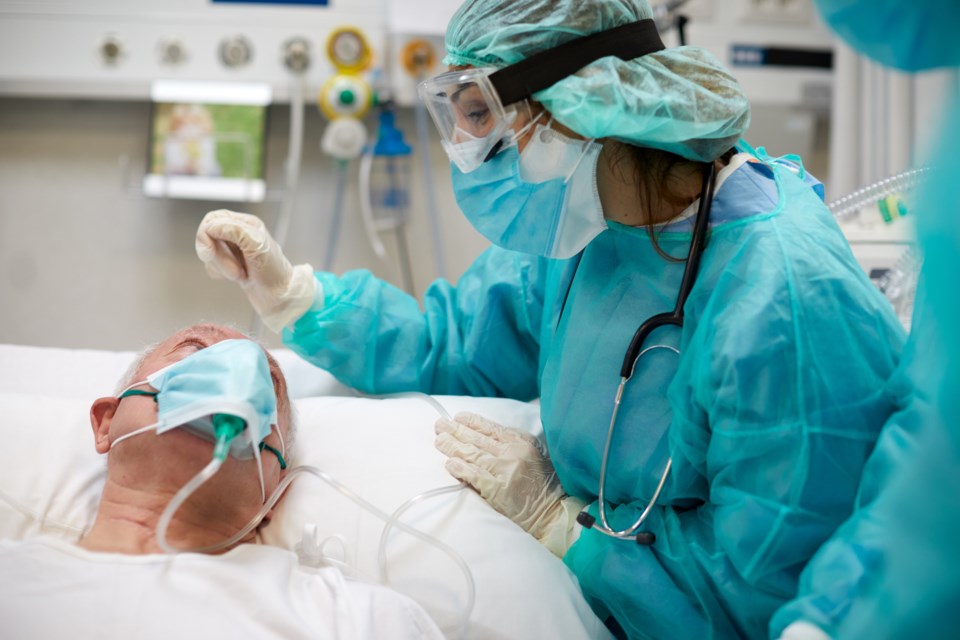B.C. continues to face sufficient serious COVID-19 infections to worry health officials, but new data shows some good news: the number of known active infections in the province has fallen to a near-10-week low.
There are 4,888 people known to be infected with COVID-19 in B.C., with the vast majority being told to self-isolate at home. The last time there were fewer known active cases was on August 13, when 4,277 people were known to be infected, and the fourth wave of the pandemic was surging.
Of those fighting infections, 370 are in hospitals, with 139 in intensive care units (ICUs).
Provincial health officer Bonnie Henry said yesterday that there are around 200 people in hospitals who are not included in that count, but are dealing with lingering health problems as a result of COVID-19.
The province's general rule for counting COVID-19 hospital patients is to limit the official number to those who are infectious, with that meaning those who have not yet gone 10 days after first feeling symptoms. Henry said this is not a hard and fast rule, and that some people could be included in that count up to 30 days after first feeling symptoms depending on the severity of their illness.
Another six people died from COVID-19 overnight, raising the province's death toll from the disease to 2,092, and underscoring the seriousness of getting infected.
Health officials detected another 696 infections overnight, raising the number of those in B.C. known to have contracted the disease to 199,534.
Of those, more than 96.3%, or 192,189 people, are deemed by the province to have recovered because they have gone more than 10 days after first feeling symptoms, and are therefore considered to be not infectious.
Vaccinations in the general population have slowed as the vast majority of people are already vaccinated.
Health officials administered initial vaccine doses to 2,787 people in the past day, as well as second doses of vaccine to 5,870 people.
Across B.C., 89.3% of eligible adults older than 12 have had at least one dose of vaccine, with 83.6% of eligible people having had two doses, according to the B.C. government.
Of the 4,138,787 B.C. residents who have received one dose of vaccine since mid-December, 2020, 93.6%, or 3,876,579, are fully vaccinated, with two doses. Health Minister Adrian Dix said October 19 that about 60,000 residents, who are either immunocompromised or who live in seniors' living facilities, have received three doses of vaccine.
The B.C. government estimated in July that the province's total population is 5,147,712, so Glacier Media's calculation is that 80.4% of B.C.'s total population has had at least one dose of vaccine, and 75.3% of the province's total population has had two doses.
"We do track vaccine effectiveness, [and] hospitalization, as a measure of severe illness by what combination of vaccines people received," Henry said October 19.
"What it does show us across the board, is that every combination is very effective at preventing severe illness. The AstraZeneca-AstraZeneca [combination] is slightly less than every other combination in terms of preventing infection, but if you go to AstraZeneca, and then in an mRNA vaccine, that protection goes back up again."
The small slice of the population that is not vaccinated is responsible for the lion's share of cases, hospitalizations and deaths.
Only 20 of the 139 people in ICUs are fully vaccinated, according to Dix.
When adjusted for age, in the week up to October 18, there were 294.3 people newly infected for each 100,000 unvaccinated British Columbians. In that same time period, there were only 86.9 people newly infected for each 100,000 partially vaccinated British Columbians, and only 32.1 people newly infected for each 100,000 fully vaccinated British Columbians.
One new health-care facility outbreak has been detected at Swedish Assisted-Living Residence in Burnaby, raising the number of such outbreaks in the province to 24. •



